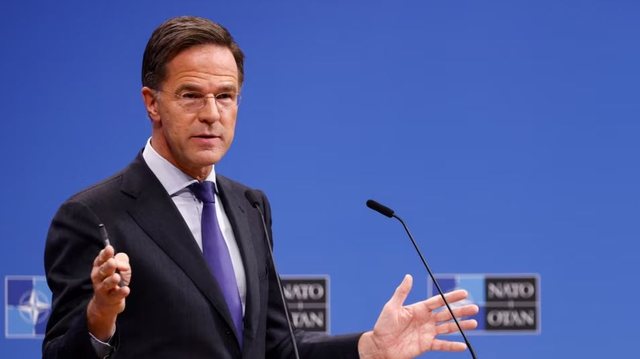
 Flash News
Flash News
Kosovo elections, Rutte: NATO will work with whoever leads the country

NATO Secretary General Mark Rutte said he expects a stable government in Kosovo after the elections and that NATO will work with whoever leads the country. He said this at a press conference ahead of a meeting of defense ministers of member states, which will take place on Thursday at the alliance's headquarters in Brussels.
"This has been a democratic process. What we understand is that we have the initial results, but the counting of votes is still ongoing and we will have the final results. And, based on the results so far, it looks like there will be a coalition government," Rutte said.
"Of course, we ensure that we will work with whoever will lead the country. And of course we wish all politicians all the best in managing the political space and ensuring that there is a stable government as soon as possible," Rutte said.
On Sunday, February 9, parliamentary elections were held in Kosovo.
Based on 99 percent of votes counted, Prime Minister Albin Kurti's Vetevendosje Movement received the most votes in the February 9 parliamentary elections, namely 47 out of 120 parliamentary seats – however, not enough to form a sole government.
According to preliminary results, the Democratic Party of Kosovo is expected to have 25 deputies, the Democratic League of Kosovo 20, and the coalition gathered around the Alliance for the Future of Kosovo 8 deputies.
These figures may change after counting conditional and diaspora votes.
After declaring victory in Sunday's elections, Kurti said that Vetëvendosje will independently form the Government.
Analysts in Kosovo assess that the current preliminary results of political entities in the February 9 elections create uncertainty regarding the exact configuration of the country's future Assembly and Government.
Political representatives of non-Serb minority communities in Kosovo, who, according to the preliminary results of the Central Election Commission, have entered the Kosovo Assembly, would support – in principle – any candidate for the formation of the new government, regardless of whether they come from the current ruling party, Vetëvendosje, or from the opposition parties.
The February 9 elections were the first regular elections that Kosovo has held since declaring independence.
Observers said the elections were peaceful, with some irregularities, but no major incidents.
The turnout was 40.59 percent of over 1.9 million eligible voters in Kosovo. Previously, the diaspora also voted for these elections, via mail, but also physically in several Kosovo diplomatic missions around the world./REL
Latest news


Not only the body, swimming also helps the brain
2025-07-05 21:02:49
"Be careful with the water", Alimehmeti warns about the health risks of summer
2025-07-05 20:39:10
PSG beats Bayern Munich 2-0, advances to Club World Cup semifinals
2025-07-05 20:19:38

Two vehicles collide on the Elbasan-Peqin axis, drivers injured
2025-07-05 19:26:29

What does Zelenskyy have more than Zegjineja?
2025-07-05 18:45:26

Fiscal peace, but at a cost
2025-07-05 18:00:10
'Bankers' tax evasion, Chinese CEO and former director jailed
2025-07-05 17:39:21
Kyle Walker joins English club on two-year deal
2025-07-05 17:20:24
Two cars collide on the Saranda-Delvina axis, 4 injured
2025-07-05 17:05:29
Touching gesture! Liverpool will pay Jota's family's salary until 2027
2025-07-05 16:45:18
The zodiac signs that cheat most often
2025-07-05 16:25:53

"I asked for the dismissals", Dredha tries to soften Rama's 'blow' in Vlora
2025-07-05 15:48:49
Bomb threat in Parliament, prosecutor: It was a lie
2025-07-05 15:22:28

Bardhi: The recount revealed how greedy Zeqine Balluku is in stealing
2025-07-05 14:44:29
Knife wound on the secondary road Tirana-Durrës, perpetrator sought
2025-07-05 14:37:54
Tears and pain, Diogo Jota is escorted to his final home
2025-07-05 14:21:34
Success starts with yourself! Simple ways to invest in personal development
2025-07-05 13:58:50
Unlicensed firearms found in apartment, 50-year-old arrested in Lushnje
2025-07-05 13:43:11

Tirana Court remands Skerdi Sina to prison
2025-07-05 12:59:34
Cocaine laboratory in Greece, here are the Albanians arrested and wanted
2025-07-05 12:40:16
Directed Justice/Vangjeli: SPAK does not investigate any scandal involving Rama
2025-07-05 12:22:03

Bomb alert, Police remove MPs and media from Kosovo Parliament building
2025-07-05 11:48:16
"The will of the people" and the irony of ordered resignations
2025-07-05 11:32:05
Summer drowning risk: How to enjoy the water without risking your life
2025-07-05 11:20:27
Fire situation in the country, 16 fires reported in 24 hours, 4 still active
2025-07-05 11:07:04
Car hits pedestrian at white lines, injured in serious condition in Vlora
2025-07-05 10:59:58
Mosquito-borne diseases are a growing problem in Europe
2025-07-05 10:44:13



One of Sweden's most dangerous and wanted criminals arrested in Turkey
2025-07-05 09:38:29
Foreign exchange/ How much foreign currencies are bought and sold today
2025-07-05 09:18:38

"Don't be influenced by the opinions of others", today's horoscope
2025-07-05 08:40:50

Morning Post/ In 2 lines: What mattered yesterday in Albania
2025-07-05 08:02:07

Trump says he's ready to raise tariffs to 70% on some countries
2025-07-04 22:35:52
Tre shenjat e zodiakut që do ‘pasurohen’ në Korrik
2025-07-04 22:05:09
Gaza War: Hamas Accepts US Proposal for 60-Day Ceasefire
2025-07-04 21:50:10
Autocracy in Albania, Fuga: Governance has gotten out of control
2025-07-04 21:40:51
Meta: Agriculture on credit, the new fraud!
2025-07-04 21:26:39




Vote recount in Durrës ends without changes
2025-07-04 20:12:54
Gas station explodes in Rome, 25 injured (VIDEO)
2025-07-04 20:00:20

These afternoon habits often sabotage weight loss
2025-07-04 19:39:28
Former Arsenal player Thomas Partey accused of rape
2025-07-04 19:24:21
Shepherd disappears without a trace in Delvina
2025-07-04 19:14:31

Bardho gave Zegjine's mandate/Braho: Unfair! It violates the electoral system
2025-07-04 19:01:08


Rapid developments in the Sultanates!
2025-07-04 18:00:06



Italy tightens rules for skateboard traffic
2025-07-04 17:20:18

Unusual for the time, dense fog covers the coast of Vlora
2025-07-04 16:48:01


Accident on the Shkodra-Lezhë axis, one dead and 3 injured
2025-07-04 16:14:19
Albania with fewer requests for asylum and Albanian citizenship in 2024
2025-07-04 16:06:57

Albania last for quality of life, DP: Technical government is the solution!
2025-07-04 15:42:30
Nico Williams says "No" to Barcelona, signs with Athletic Club until 2035
2025-07-04 15:33:35
Fires in the country, four fires are still active, what is the situation?
2025-07-04 15:24:20

Summer brings big changes for these 4 zodiac signs
2025-07-04 15:00:04
Osmani: MPs need to agree to a secret ballot for the Speaker of Parliament
2025-07-04 14:51:09
Serious accident on the Peqin-Elbasan axis, two injured
2025-07-04 14:37:56

GJKKO leaves in force the security measure for the head of the KPP
2025-07-04 13:58:17
Who will replace Ilir Meta and take over the leadership of the PL?
2025-07-04 13:50:36
Berisha: Dismissal of directors in Vlora, another act of 'scapegoats'
2025-07-04 13:41:46




Librazhd/ In a serious psychological state, the young man consumes pesticides
2025-07-04 13:05:07


Weapons trafficked from Kosovo to Albania, two arrested, 8 pistols seized
2025-07-04 12:33:28
Konsumimi i tepërt i çokollatës, ja cilat janë dëmet që shkakton në organizëm
2025-07-04 12:23:35

Fires in the country, 21 fires in the last 24 hours, 4 still active
2025-07-04 12:00:19
WB calls for debt transparency: Albania to publish details of every loan
2025-07-04 11:50:05
